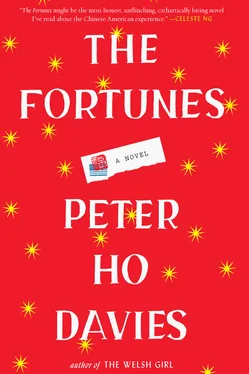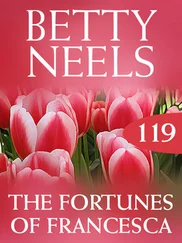He hadn’t known her for a moment. She had painted her face, a dainty red bow in the center of her wide mouth making her lips seem pursed in anger. He wondered, fleetingly, if it resembled his mother’s face.
He wandered the streets, trembling, his skin tight and feverish, for what seemed like hours, meeting nothing but male faces until he persuaded himself she couldn’t have recognized him. When he returned the moon had risen like a button in the sky and the shutter in her door was closed.
Ling’s own “room” was a splintery corner screened by hanging laundry. He’d lain awake, watching the clothes sway back and forth in the breeze until they rocked him to sleep, and even when he woke in the dingy morning light he thought he was still dreaming. From his pallet he could see a pair of bound feet and calves beneath the drifting hems and tails. He watched her — for it was her — move around, start a fire, set a kettle to boil (its stiff iron spout reminding him of his erection), and fill one of the laundry tubs until steam billowed from it. He figured she was preparing for the first load of wash until she dropped her shift — he saw it crumple around her clenched feet before she kicked it into the laundry pile — and stepped into the water. It must have been very hot, because she lowered herself slowly — dimpled thighs, flaring buttocks ( Look away, he thought, but he couldn’t), slim back and bony shoulders speckled with moles — until her round face came into view, shiny with sweat and tight with pain. He held his breath in secret sympathy. She set about herself roughly then, with a washcloth, shoving it first between her legs and over her breasts as if they belonged to someone else, pummeling her body as if — already he couldn’t think of it any other way — it were a load of laundry. He wanted to go to her suddenly, to stay her hand, take the cloth from her and use it more gently.
Only after she had dashed scoops of water over herself from a bamboo dipper did she allow herself a moment to lean her head back on the edge of the tub, silken ribbons of lank hair dripping on the boards. The tightness around her eyes and mouth eased, like creases loosened by steam, and he saw how young she was. When she rose from the water, glistening like silver, he found himself looking away at last, even before she wrapped herself in towels, helped herself to a bowl of rice porridge, and retreated to her room.
He lay back and stared at the shivering spangles of light reflected off the slough onto the sheets around him.
He’d seen women naked before, of course. He used to spy on the girls with their men at the brothel, but he never imagined himself with any of them. They’d mothered him when he was small, bossed him when he was older, stirred no desire in him (though he missed being surrounded by women in this bachelor city). He watched them in an effort to picture his mother and father together. The men rarely had a face, though. It was just the back of their heads he saw, their hair light brown or blond or tinged with red, tied off in the short, tarred ponytail of a sailor.
He ladled porridge for himself and ate it staring at the new stack of coins set next to the ashy stems of incense on the faded red shelf they used as a shrine. Little Sister had left a kettle on the fire, and when the steam began gushing from its spout he set about filling the first of the morning’s laundry tubs, grating soap into it. He soaked and scrubbed and rinsed and wrung half a dozen more loads under Uncle Ng’s cloudy eyes (the old man had stumbled in shortly after Little Sister had retired and swept the offering of coins into his hand) before his boss loaded him with string-and-brown-paper parcels of clean laundry and beckoned him—“Come, boy”—to follow him out into the city on his delivery route.
Ling had been thrilled at first by the bright bustle of the streets — the hollow thunder of boots on boardwalks, the shivery jangle of harness, or spurs, or coin, and over them all, momentarily seeming to silence every other sound, the steam whistles of the paddle wheelers announcing a fresh surge of disembarking passengers through the streets like a foaming tide. Everything seemed to shine under the high white sun. He craned his neck to squint up at the three-story buildings, marveled at the plate glass, the names of stores and businesses emblazoned in gold as if on the very air, alongside his own gape-mouthed reflection. But most of all he stared at the white ghosts striding or riding by: “So many it’s like Yu Lan,” as someone had said when they’d arrived in San Francisco, meaning the Ghost Festival, when the gates of hell swung open for hungry spirits to walk abroad. Ever since he’d learned his father’s race, Ling had found himself shy around foreigners and yet drawn to them in the streets or in Big Uncle’s opium den, staring at them as if he might guess at what his father looked like, what he might have inherited from him. For years he’d studied his nose in the mirror, wondering if it would grow big as a devil’s, but it had remained small and flat, to his relief; it was at best a dubious distinction to be Eurasian. Only in the hinges of his eyes, where the lids folded, he fancied he saw a crease of his heritage. He felt the same fascination now, except at home he’d been invisible, one face in the crowd; here he felt as if he were subject to stares himself, the ghosts meeting his gaze and scowling, until Uncle Ng cuffed him and told him to keep his eyes to himself.
Ling had concentrated on the packages clutched to his chest — Ng had a baying pole slung over his shoulders with more parcels dangling from it — cradling the laundered clothes from the filth of the city, the glossy clods of horse manure, the dust lacing the warm air. If he had owned such linens, he thought, he would never have worn them. But he had trudged back to the laundry more circumspectly at the end of the day, staggering under the pole himself now, malodorous sacks of dirty washing hooked on notches at either end, swaying heavily with each step.
That had been only mildly humiliating, though, compared to the gauntlet of ghost boys he and Ng had had to run. They capered alongside, holding their noses or making monkey noises, pelting the two Chinese with horse apples from the roadway. Most of all they enjoyed darting close to tug on Ling’s queue — Ng, he noticed too late, had tucked his in his collar — sometimes so hard that Ling found himself toppling. A Yankee yank, they called it, never mind their Irish accents. It was as if they were mocking his foolish notions of kinship. He wanted to fight back — Ng had a laundry bat tucked in his belt like a truncheon — or at least shout back, but Ng hissed at him to be quiet, to keep his head down and put the end of his queue in his pocket, and he had to content himself with swinging his carry pole in wary circles to ward them off.
“Don’t let them provoke you,” Ng advised, waving a hand before his face. “They’re only flies.”
Which makes us dung, Ling thought, getting a whiff of his burden.
4.
And so this was his life. Washing in the mornings, deliveries every afternoon while the clothes dried, ironing at night. And always, always thinking of Little Sister, especially evenings when Ng set him to watch the shop. He’d shown him the cleaver he kept under the counter in case of trouble, a confidence that had made Ling swell with importance, though Little Sister herself had only sneered. “You in charge? Wa!” She fingered the chopstick holding up her hair. “I can look out for myself.” Many of her clients saw so few women that they were shy and mannerly with her. Besides, she reminded him, she peddled opium in addition to her other services, which settled the more boisterous among them, though he had seen her in her bath scrubbing at bruises as if they were stains. Still, Ng’s behest made Ling feel protective of her, obliged him to listen to the noises from her crib — fleshy smacks, low chuckles, and a panting giggle that must have been hers — hefting the cleaver, as if hoping for a scream, an excuse to burst in. He never heard her laugh like that during the day, and he couldn’t help but imagine those muffled, complicit sniggers directed at him. He pressed his hands to his ears, the blade of the cleaver cool at his temple. Every night of his childhood he’d nodded off to the slap of skin, indistinguishable from the lap of water against the hull of the flower boat, but he couldn’t sleep now until her work was done and she slipped out of her room to urinate softly—“So- dah! ”—into the latest tub of stained clothes they were soaking (an idle defiance, since all their laundry water came from the slough that served as sewer for half the town).
Читать дальше












